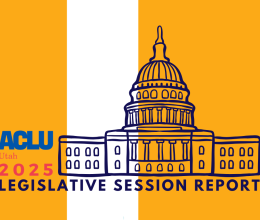
Dear Governor Cox,
The American Civil Liberties Union of Utah (ACLU of Utah) strongly urges you to veto Senate Bill 200, "State Commission on Criminal and Juvenile Justice Amendments.” Among other changes, SB 200 significantly reduces the number of members on the Utah Sentencing Commission (the “Commission”). The Commission’s primary roles are to prepare sentencing guidelines for crimes in Utah and to provide input to state policymakers on proposed criminal justice bills and other bills that would impact sentencing in Utah.
Our main concern about SB 200 is that it completly eliminates the following Commission members: “two members from the public appointed by the governor who exhibit sensitivity to the concerns of victims of crime and the ethnic composition of the population.” Utah Code Section 63M-7-401(2)(t). As you are aware, federal and state governments have adopted sentencing guidelines in an effort to promote fairness and uniformity in sentencing. Having uniform guidelines for defense attorneys, prosecutors, judges, and the Utah Board of Pardons and Parole helps to alleviate any potential unfair sentencing variations based on factors outside of the control of the individual being sentenced. These factors include the size and location of the community, the leanings of the sentencing judge, and especially, the race, ethnicity, gender, or other identity trait of the person before the court.
As the Utah Commission on Criminal and Juvenile Justice (CCJJ) observed in 2020, “Minority racial and ethnic groups continue to be over-represented in Utah’s criminal justice system. As we look at the prison system, the most severe point of contact, this over-representation is seen by their higher share of representation in the prison population versus their general population count (22 vs 36%).” “How Research Can Help Reduce Racial & Ethnic Disparities in Utah’s Criminal Justice System,” CCJJ, September 2020. https://justice.utah.gov/wp-content/uploads/How_Research_Can_Help_Elimin...
Now is not the right time to eliminate the positions of Commission members who are expressly concerned with issues about how race and ethnicity might wrongly factor into sentencing in Utah. The best way to combat unfair disparities in sentencing and other aspects of the criminal justice system is to confront them in the open and head on. Eliminating these two members silences those concerns, sending the message that Utah is not concerned about racial and ethnic fairness in its criminal justice system. We know that this is not a message that you endorse.
In addition to these two critical seats, SB 200 eliminates various other Commission members, including seats for judges and lawmakers, a representative of the public, a person who works in civil rights, and others. In all, the bill reduces the Commission from 28 to 15 voting members. While we understand the generic concern about the size of commissions, we see no advantage in reducing the membership of the Commission. From our experience with the Commission, we have seen that the 28 voting members work together in an efficient, cooperative, and collegial manner. Having a wide range of voices with area expertise lends a considerable amount of substance to the Commission’s deliberations. These members ensure that all of the Commission’s recommendations and work product are the result of well-informed discussions from members with differing, often opposing viewpoints. More often than not, the Commission’s work product is the result of building consensus, and rarely does the Commission release a guideline or recommendation that reflects a narrow, one-sided position. In other words, the Commission currently functions as a marketplace of ideas among members with real interests in the practical outcomes and expertise in the fields they represent. Commission members are not paid for their service, and volunteer their time to assist in working toward the best results for everyone in Utah.
SB 200’s elimination of 13 positions will not improve or even streamline the work of the Commission. Instead, it will cut out critical perspectives on racial and ethnic justice in particular, and eliminate passionate stakeholders and experts in general. We urge you to veto it.
Sincerely,
Brittney Nystrom
Executive Director, ACLU of Utah

